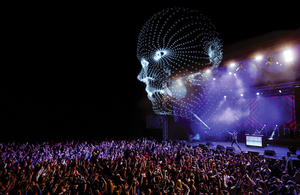New immersive designs to transform audience experiences
Projects have received funding to apply human-centred design to understand user needs and create new immersive experiences and products.

Immersive technology could change the way we experience entertainment.
Immersive experiences like virtual, augmented and mixed reality could transform how we interact with the world – from advertising to film, music and museums.
To ensure these experiences meet customer needs, £1 million in funding has been awarded to 32 projects which will use human-centred design (design focused on user requirements) to create new immersive experiences, products and services.
The successful projects will use customer research to generate ideas, and create and test low-cost prototypes. The best ideas will progress to further technical research and development (R&D).
The successful projects are part of the Industrial Strategy Challenge Fund’s audience of the future programme, which is delivered by UK Research and Innovation. Through this programme, government is supporting the best UK storytellers to create engaging immersive experiences.
Successful projects
The XR Audience Centred Design project will enable theatre audiences to experience a virtual reality performance without every audience member having to wear a headset. It will use audience feedback to test approaches to virtual reality in theatre.
The ALIVEmusic project will investigate how live music performances can be enhanced using mixed reality. It will use AI to capture the emotional states of performers and audiences, which will be transformed into visual content and displayed in real-time using mixed reality headsets or mobile phones.
The House of Alternate Realities will investigate how audiences can be engaged through immersive and interactive stories. People will pass through 5 rooms which are each more immersive and interactive than the last and their reactions will be studied. The project will determine how to deliver new forms of interactive content to UK television audiences.
The Emotion sensing project will use biosensors to capture real-time emotional responses and find out what makes an engaging immersive experience. This new evaluation approach will generate more reliable feedback to inform content creation and help to personalise immersive experiences.
Updates to this page
-
Added a link to the full list of successful projects
-
First published.